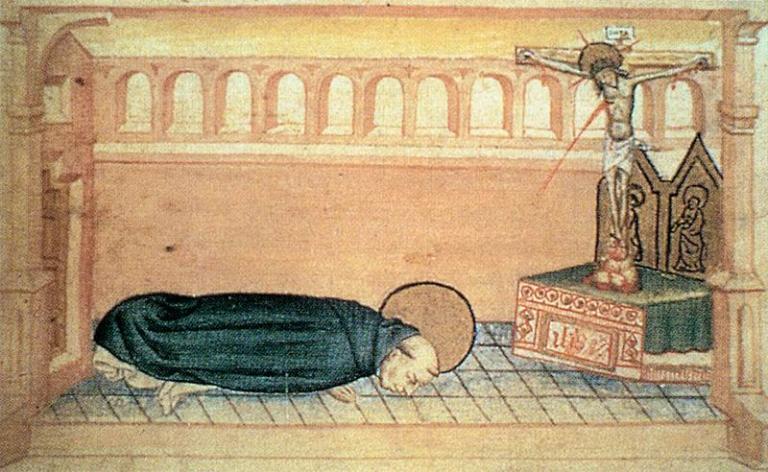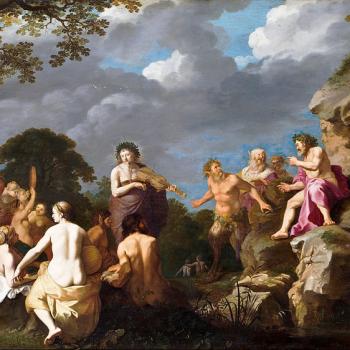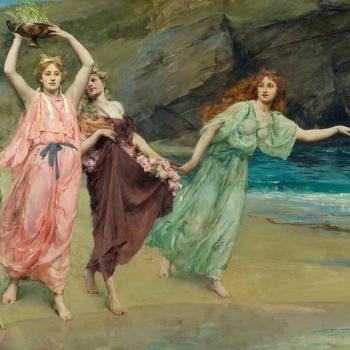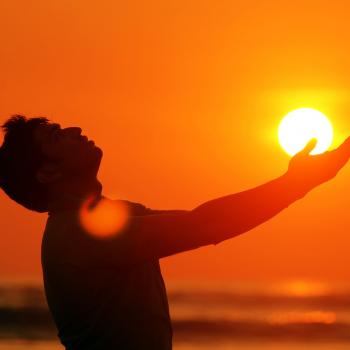August 15th marked a significant feast holiday for both Catholics and Orthodox Christians. Catholics call it the Feast of the Assumption of the Virgin Mary. Orthodox Christians call it the Feast of the Dormition of the Virgin Mary. It is the day that Mary died or “goes to sleep” and is taken into heaven. It is the second biggest religious celebration in Greece after Easter.
This blog entry is a religious commentary and critical evaluation of the Orthodox acts of prostration done during the feast on the island of Tinos and how it is against the values of Hellenism. Being that it was the feast for the Virgin Mary, an article appeared on my wall which shard a tradition on the island of Tinos that is done on this feast day. From the article:

“…the annual celebration yields an extra meaning on the Greek island of Tinos, where thousands of religious pilgrims endure scorching heat as they climb on hands and knees from the island’s port to reach one of Greece’s most important religious monuments.
The church of the Evagelistria on Tinos was built in 1823 to house an icon found in 1822, and for decades has attracted thousands of Greek Orthodox faithful who believe their pleas for a miracle will be answered by the Virgin Mary.”
When I look at these photos of people crawling on hot roads, from the port to the church, up the stairs all I can think is how sad this is. How sad that they believe that is piety that is what their god would like. That they have been taught from childhood, this is good and acceptable behavior towards a deity. One of the photos shows a small childing crawling up those stairs. It is horrifying to me to see these images.
I have been criticized for this opinion/evaluation as not being “open-minded” – given I study religion. As someone who studied religion, yes, I can be objective if I must. But not on this. Being Greek and seeing things as a former participant I can criticize it from the inside. As a Greek who practices Hellenism, I can criticize it and recognize the shift that has occurred from Hellenism to Christianity and how this shift in religions has crushed the Greek people.
Greece is known for its financial problems, but the deeper problem in Greece is a spiritual one. Orthodoxy has been a burden on the country and the people. It has turned the country and people into a shadow of its former self. Greeks have been subjected to spiritual slavery, crushed by the weight of the cross.
The kind of prostration conducted on Tinos is humiliating. In Hellenism, such prostration is degrading and above all – slave behavior. Orthodox Christians call themselves “servants of god” (δούλη του Θεού). A nice way to say slaves of god. When you think of yourself as a slave, it is perfectly acceptable to crawl on your hot pavement for your master, your god.
The Greeks, before Christianity, did not think of themselves as slaves of the gods. No. They did not crawl on their hands during festivals. The Pythia of Delphi did not crawl into the temple to speak Apollo’s word. Greeks approach the gods with dignity, standing up with their hands to the sky. We approach the gods as equals because we come from the same place as them. Humanity is kin to the gods.
The evidence that we have from antiquity does not support the practice of prostration like that which is done in Tinos as a Greek behavior or acceptable behavior for anyone to perform. The action of prostration done by Christians originates in the east and not from the Greeks. It is not the normative behavior in the Greek world to act that way. Philostratus and Plutarch are two valuable sources which explain the unfitting nature of this prostration.
Philostratus’s Life of Apollonius of Tyana records the Greek understanding that prostration is fit for slaves. Apollonius is speaking with Thespesion, who asks about the “custom of scourging” in a ceremony in honor of the Scythian Artemis in Sparta. Thespesion informs us that the goddess (Scythian Artemis) was introduced from Taurus and Scythia, and that the men of Sparta had embraced “alien customs.” Thespesion also describes the custom “fit for slaves.” Apollonius tells us that it is “poor wisdom” to think the gods support such behavior.
Plutarch, philosopher and High Priest of Delphi based on his writings in On Superstition would without a doubt be disturbed by the acts of the people on Tinos. He describes actions of “uncouth prostrations” “disgraceful besieging of the gods” such as “casting down with the face to the ground” caused by superstition.
It is not humbling or pious to harm yourself, to crawl on the floor, or to in any way degrade your human spirit for the gods. It is not prideful to refuse such actions – because to reject such behavior is to reject spiritual slavery. We are not slaves, and we are not worthless. It is disrespectful to the self and to the gods. The gods would never want us to behave in this way for the negative impact it has on the soul. It plants the seeds of subordination in the soul which bloom within the mind to corrupt the person from true spiritual progress and liberation with the aide of the gods. You will have trouble building strong people when you teach them that weakness and self-harm are virtues.

















